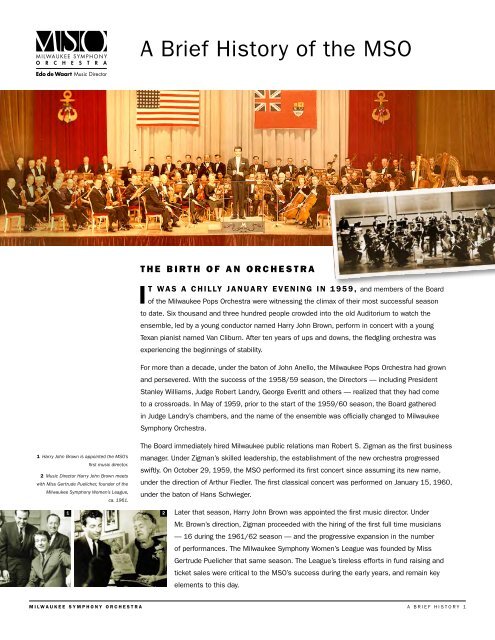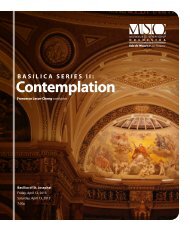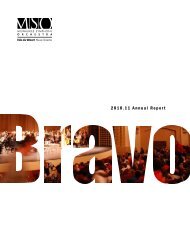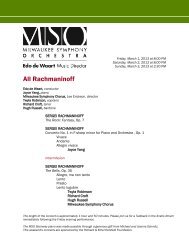A Brief History of the Mso - Milwaukee Symphony Orchestra
A Brief History of the Mso - Milwaukee Symphony Orchestra
A Brief History of the Mso - Milwaukee Symphony Orchestra
Create successful ePaper yourself
Turn your PDF publications into a flip-book with our unique Google optimized e-Paper software.
A <strong>Brief</strong> <strong>History</strong> <strong>of</strong> <strong>the</strong> MSO<br />
1 Harry John Brown is appointed <strong>the</strong> MSO’s<br />
first music director.<br />
2 Music Director Harry John Brown meets<br />
with Miss Gertrude Puelicher, founder <strong>of</strong> <strong>the</strong><br />
<strong>Milwaukee</strong> <strong>Symphony</strong> Women’s League,<br />
ca. 1961.<br />
1 2<br />
The Birth <strong>of</strong> an <strong>Orchestra</strong><br />
It was a chilly January evening in 1959, and members <strong>of</strong> <strong>the</strong> Board<br />
<strong>of</strong> <strong>the</strong> <strong>Milwaukee</strong> Pops <strong>Orchestra</strong> were witnessing <strong>the</strong> climax <strong>of</strong> <strong>the</strong>ir most successful season<br />
to date. Six thousand and three hundred people crowded into <strong>the</strong> old Auditorium to watch <strong>the</strong><br />
ensemble, led by a young conductor named Harry John Brown, perform in concert with a young<br />
Texan pianist named Van Cliburn. After ten years <strong>of</strong> ups and downs, <strong>the</strong> fledgling orchestra was<br />
experiencing <strong>the</strong> beginnings <strong>of</strong> stability.<br />
For more than a decade, under <strong>the</strong> baton <strong>of</strong> John Anello, <strong>the</strong> <strong>Milwaukee</strong> Pops <strong>Orchestra</strong> had grown<br />
and persevered. With <strong>the</strong> success <strong>of</strong> <strong>the</strong> 1958/59 season, <strong>the</strong> Directors — including President<br />
Stanley Williams, Judge Robert Landry, George Everitt and o<strong>the</strong>rs — realized that <strong>the</strong>y had come<br />
to a crossroads. In May <strong>of</strong> 1959, prior to <strong>the</strong> start <strong>of</strong> <strong>the</strong> 1959/60 season, <strong>the</strong> Board ga<strong>the</strong>red<br />
in Judge Landry’s chambers, and <strong>the</strong> name <strong>of</strong> <strong>the</strong> ensemble was <strong>of</strong>ficially changed to <strong>Milwaukee</strong><br />
<strong>Symphony</strong> <strong>Orchestra</strong>.<br />
The Board immediately hired <strong>Milwaukee</strong> public relations man Robert S. Zigman as <strong>the</strong> first business<br />
manager. Under Zigman’s skilled leadership, <strong>the</strong> establishment <strong>of</strong> <strong>the</strong> new orchestra progressed<br />
swiftly. On October 29, 1959, <strong>the</strong> MSO performed its first concert since assuming its new name,<br />
under <strong>the</strong> direction <strong>of</strong> Arthur Fiedler. The first classical concert was performed on January 15, 1960,<br />
under <strong>the</strong> baton <strong>of</strong> Hans Schwieger.<br />
Later that season, Harry John Brown was appointed <strong>the</strong> first music director. Under<br />
Mr. Brown’s direction, Zigman proceeded with <strong>the</strong> hiring <strong>of</strong> <strong>the</strong> first full time musicians<br />
— 16 during <strong>the</strong> 1961/62 season — and <strong>the</strong> progressive expansion in <strong>the</strong> number<br />
<strong>of</strong> performances. The <strong>Milwaukee</strong> <strong>Symphony</strong> Women’s League was founded by Miss<br />
Gertrude Puelicher that same season. The League’s tireless efforts in fund raising and<br />
ticket sales were critical to <strong>the</strong> MSO’s success during <strong>the</strong> early years, and remain key<br />
elements to this day.<br />
<strong>Milwaukee</strong> <strong>Symphony</strong> <strong>Orchestra</strong> A <strong>Brief</strong> <strong>History</strong> 1
On to Carnegie Hall and Europe<br />
3<br />
4<br />
Kenneth Schermerhorn succeeded Harry John Brown in 1968 as music director.<br />
During his tenure (1968 –1980), Schermerhorn collaborated with Margaret Hawkins on <strong>the</strong><br />
formation <strong>of</strong> <strong>the</strong> <strong>Milwaukee</strong> <strong>Symphony</strong> Chorus, initiated state touring, and inaugurated <strong>the</strong><br />
youth and high school concert series. He took <strong>the</strong> MSO to Carnegie Hall for <strong>the</strong> first time —<br />
a performance that led The New Yorker to proclaim <strong>the</strong> young ensemble “as beautifully trained<br />
and subtly coordinated as <strong>the</strong> finest in <strong>the</strong> land.”<br />
At <strong>the</strong> beginning <strong>of</strong> <strong>the</strong> 1981/82 season, <strong>the</strong> music director’s baton was turned over to Lukas<br />
Foss. A noted conductor, composer, and pianist, Foss broadened <strong>the</strong> MSO’s repertoire to include a<br />
greater emphasis on contemporary and American music and <strong>the</strong> lesser known works <strong>of</strong> traditional<br />
composers. The Foss era included festivals celebrating <strong>the</strong> music <strong>of</strong> Leonard Bernstein and Aaron<br />
Copland (both attended by <strong>the</strong> composers), as well as <strong>the</strong> recording <strong>of</strong> two albums on <strong>the</strong> ProArte<br />
label.<br />
In 1986 <strong>the</strong> MSO, led by Lukas Foss, embarked on its first European tour, performing in England,<br />
Holland, West Germany, and Austria. The London Financial Times declared <strong>the</strong> orchestra “worthy <strong>of</strong><br />
international status.” Hamburg’s Die Welt called <strong>the</strong> MSO musicians “highly commendable musical<br />
ambassadors <strong>of</strong> <strong>the</strong> Midwest.”<br />
The Macal Era<br />
5<br />
3 Gene Gilmartin, Michael J. Schmitz, Orren<br />
J. Bradley, William D. Van Dyke, III, and Charles<br />
Krause at Carnegie Hall, October 1989.<br />
4 Charismatic Music Director Kenneth<br />
Schermerhorn conducts <strong>the</strong> orchestra in<br />
Uihlein Hall; Edward Mumm, concertmaster.<br />
5 Music Director Lukas Foss interviews<br />
composer Aaron Copland on stage at <strong>the</strong> MSO’s<br />
Aaron Copland Festival.<br />
Zdenek Macal became <strong>the</strong> fourth music director in September 1986. Under his baton <strong>the</strong><br />
orchestra refined its skills and enhanced its reputation. In 1987 <strong>the</strong> MSO returned to Carnegie<br />
Hall for <strong>the</strong> first time under Macal’s baton. The New York Times called it a “shiny young example<br />
<strong>of</strong> America’s virtuoso orchestra tradition.”<br />
Zdenek Macal took <strong>the</strong> MSO on tour throughout <strong>the</strong> eastern United States in 1989 and on a<br />
major tour <strong>of</strong> Japan in 1992. In 1989 <strong>the</strong> <strong>Milwaukee</strong> <strong>Symphony</strong> returned to <strong>the</strong> recording studio<br />
under a new <strong>Milwaukee</strong>-based label, Koss Classics, founded by MSO Board member Michael<br />
J. Koss as a subsidiary <strong>of</strong> <strong>the</strong> Koss Corporation. Among<br />
<strong>the</strong> most notable results was a set <strong>of</strong> CDs featuring <strong>the</strong><br />
symphonies and tone poems <strong>of</strong> Antonin Dvořák.<br />
In 1990, The Arts in Community Education (ACE) program<br />
was formed and has since grown into <strong>the</strong> largest and<br />
most comprehensive education program <strong>of</strong> any American<br />
orchestra.<br />
Zdenek Macal relinquished his post as music director at <strong>the</strong><br />
conclusion <strong>of</strong> <strong>the</strong> 1994-1995 concert season. Stanislaw<br />
Skrowaczewski, former music director <strong>of</strong> <strong>the</strong> Minnesota<br />
<strong>Orchestra</strong>, was appointed artistic advisor for <strong>the</strong> 1995/96<br />
and 1996/97 seasons. Doc Severinsen accepted <strong>the</strong> post <strong>of</strong> Principal Pops Conductor beginning<br />
in 1994, leading <strong>the</strong> Pops series to new levels <strong>of</strong> variety and excitement.<br />
<strong>Milwaukee</strong> <strong>Symphony</strong> <strong>Orchestra</strong> A <strong>Brief</strong> <strong>History</strong> 2
6 7<br />
6 Public Relations Director Andy Buelow<br />
welcomes Maestro Andreas Delfs<br />
to <strong>Milwaukee</strong>.<br />
7 The MSO on stage in Cuba in 1999 —<br />
<strong>the</strong> first major orchestra to visit <strong>the</strong> country<br />
in nearly 40 years.<br />
A New Generation<br />
Andreas Delfs was appointed <strong>the</strong> fifth music director <strong>of</strong> <strong>the</strong> MSO beginning in September 1997.<br />
Under his dynamic leadership, <strong>the</strong> MSO continued to expand musically on its strong artistic foundations<br />
and to build new bridges into <strong>the</strong> community.<br />
In 1999, <strong>the</strong> MSO embarked on <strong>the</strong> Cuba Millennium Tour, <strong>the</strong> first by a major orchestra in nearly<br />
40 years. International media attention brought <strong>the</strong> MSO into <strong>the</strong> spotlight for its efforts that brought<br />
classical music to <strong>the</strong> country and showed a gesture <strong>of</strong> improved U.S. relations with Cuba.<br />
Under Delfs’ baton, <strong>the</strong> MSO became widely known as a purveyor <strong>of</strong> new music with annual<br />
performances <strong>of</strong> world premiere pieces and commissioned works. Among <strong>the</strong> works were Philip Glass’<br />
The Hours Suite in 2002, Gil Shohot’s Songs <strong>of</strong> <strong>the</strong> Bathsheba in 2005, Roberto Sierra’s La Salsa in<br />
2006, and Lowell Liebermann’s Piano Concerto No. 3 in 2006. Delfs also attracted tremendous talent<br />
to <strong>Milwaukee</strong> with Yo-Yo Ma, Itzhak Perlman, Ute Lemper, and Renee Fleming.<br />
A string <strong>of</strong> recording ‘firsts’ for <strong>the</strong> MSO occurred between 2004 and 2007, beginning with <strong>the</strong> release<br />
<strong>of</strong> <strong>the</strong> first modern recording in English <strong>of</strong> Humperdinck’s Hansel and Gretel on <strong>the</strong> Avie label. In 2005,<br />
under <strong>the</strong> MSO Classics label, <strong>the</strong> MSO became <strong>the</strong> first American orchestra to distribute its own live<br />
recordings through online stores including iTunes. Soon after, <strong>the</strong> MSO launched an online music store<br />
at www.mso.org where <strong>the</strong> first live orchestral binaural recording was released, <strong>the</strong> Saint-Saens<br />
Organ <strong>Symphony</strong>.<br />
Late in 2006, Andreas Delfs announced his intentions to step down after <strong>the</strong> MSO’s 50th anniversary<br />
season in 2009. Also in 2006, Principal Pops Conductor Doc Severinsen announced that <strong>the</strong> 2006/07<br />
season would be his last. He assumed <strong>the</strong> title <strong>of</strong> pops conductor emeritus at <strong>the</strong> end <strong>of</strong> that season.<br />
In November <strong>of</strong> 2007, legendary entertainer Marvin Hamlisch became <strong>the</strong> MSO’s new Stein Family<br />
Foundation Principal Pops Conductor, continuing <strong>the</strong> pursuit <strong>of</strong> artistic and entertainment excellence in<br />
<strong>the</strong> Pops series.<br />
Following his triumphant final concert in June <strong>of</strong> 2009 — Mahler’s dramatic <strong>Symphony</strong> No. 8 <strong>Symphony</strong><br />
<strong>of</strong> a Thousand — Andreas Delfs assumed his new role as <strong>the</strong> MSO’s conductor laureate.<br />
<strong>Milwaukee</strong> <strong>Symphony</strong> <strong>Orchestra</strong> A <strong>Brief</strong> <strong>History</strong> 3
The Edo Effect<br />
On January 3, 2008, preeminent Dutch conductor Edo de Waart was<br />
named <strong>the</strong> orchestra’s sixth music director. His concerts in April <strong>of</strong> 2008, which featured Holst’s<br />
The Planets and Strauss’ Metamorphosen, brought more than 9,000 audience members to Uihlein<br />
Hall to witness his <strong>Milwaukee</strong> premiere.<br />
8<br />
De Waart’s first season as music director drew much critical acclaim with performances <strong>of</strong> Mahler’s<br />
<strong>Symphony</strong> No. 5 and <strong>the</strong> MSO premiere <strong>of</strong> Leonard Bernstein’s <strong>Symphony</strong> No. 1 Jeremiah, as well as<br />
a highly celebrated all-Rachmanin<strong>of</strong>f program which included virtuoso pianist Joyce Yang.<br />
8 Music Director Edo de Waart in his<br />
third season with <strong>the</strong> MSO.<br />
9 From 16 full-time musicians in 1959<br />
to 88 full-time musicians in 2011—<br />
over five decades <strong>of</strong> musical excellence.<br />
In October 2009, de Waart embarked on his first Wisconsin State Tour which included concerts in<br />
Marinette, Merrill, Madison, and Ripon, as well as Naperville, Illinois. The Naperville performance<br />
enjoyed a rave review in <strong>the</strong> Chicago Tribune. During <strong>the</strong> tour week, de Waart was asked to step<br />
in for an ailing James Levine to conduct Strauss’ Der Rosenkavalier with opera superstars Susan<br />
Graham and Renée Fleming at <strong>the</strong> Metropolitan Opera in New York. The performances, as well as<br />
<strong>the</strong> extraordinary lengths de Waart took to conduct concerts in both New York and Wisconsin, were<br />
covered in a front-page story in <strong>the</strong> <strong>Milwaukee</strong> Journal Sentinel. He capped <strong>of</strong>f his marathon <strong>of</strong><br />
October concerts by leading <strong>the</strong> MSO in sold-out performances <strong>of</strong> Bartok’s Bluebeard’s Castle with<br />
set designs by world-famous glass artist Dale Chihuly.<br />
De Waart’s second season started with Beethoven’s Ninth <strong>Symphony</strong>. Of <strong>the</strong> performance,<br />
Elaine Schmidt (<strong>Milwaukee</strong> Journal Sentinel) wrote, “It’s entirely possible that people passing by<br />
Uihlein Hall heard <strong>the</strong> final movement <strong>of</strong> <strong>the</strong> <strong>Milwaukee</strong> <strong>Symphony</strong>’s thrilling season opener Friday<br />
evening.” The season also included John Adams’ Harmonium, Beethoven’s Eroica, an encore all-<br />
Rachmanin<strong>of</strong>f weekend with Joyce Yang, <strong>the</strong> return <strong>of</strong> Itzhak Perlman and Joshua Bell, as well as a<br />
three-week German Festival featuring Wagner’s Die Walküre, Act. 1.<br />
In addition, <strong>the</strong> MSO announced that it will be going to Carnegie Hall for <strong>the</strong> 12th time in<br />
its 50-year history as part <strong>of</strong> <strong>the</strong> Spring for Music festival. The concert will be held on May 11, 2012.<br />
mso.org<br />
To learn more about <strong>the</strong> <strong>Milwaukee</strong> <strong>Symphony</strong> <strong>Orchestra</strong>, visit www.mso.org.<br />
<strong>Milwaukee</strong> <strong>Symphony</strong> <strong>Orchestra</strong> A <strong>Brief</strong> <strong>History</strong> 4








